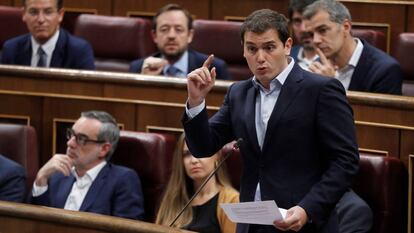Why Ciudadanos leader Albert Rivera is mistaken
The decision by the politician to withdraw his party’s support for Article 155 is untimely and opportunistic

Ciudadanos leader Albert Rivera’s decision to abruptly withdraw his party’s support for the application of Article 155 in Catalonia is untimely and opportunistic. Untimely because it comes just when it looks like secessionists are on the path to forming a regional government – a worrying option but better than continuing the current political impasse and risking yet another election. And opportunistic because by withdrawing his support for the government of Prime Minister Mariano Rajoy, he is weakening the bloc of constitutional parties in order to separate Ciudadanos from the Popular Party (PP), as poll after poll shows that his party is gaining ground among voters.
Breaking the pact with the government goes against the conciliatory and central image Ciudadanos tries to present
It’s possible to agree with some of Rivera’s arguments. The leader has accused the government of being passive for not appealing the right of fugitive deputies (Carles Puigdemont and Toni Comín) to vote by delegation and not controlling more stringently the use of public funds in the Catalan independence drive. These are differences of opinion, however, that should in no way blow apart constitutional unity in a state issue such as this one. If there is a problem of institutional scale in Spain today, it is the secessionist challenge. Breaking the pact with the government, in a heated war of words in Congress, goes against the conciliatory and central image Ciudadanos tries to present. Rivera’s insistence in questioning the government’s handling of Catalonia in parliament looks like a purely political tactic.
A year after the municipal and regional elections, Mariano Rajoy and Alberto Rivera stopped communicating – which is paradoxical given that Rajoy was in power thanks to votes from Rivera’s party. Both leaders have a duty to understand one another on the more important issues, simply out of institutional loyalty. The Constitutional Court has already accepted Ciudadanos’ bid to stop voting by delegation. Nothing would have changed if the government joined the measure. The public rupture was more to do with personal differences, which Rajoy is also to blame for given that, as prime minister, it is his duty to build consensus.
The PP, with Rajoy at the helm, has opted for a suicidal strategy. Seeing Ciudadanos steal votes from its supporters, the party has mistreated its partner in government without realizing that the rift between the two groups will damage it more. Despite its position of power, the PP already showed itself unable to neutralize the threat of unilateral Catalan independence, leading to the crisis levels of last fall. Rivera must learn statesmanship, something that Rajoy lacked in all his years when in opposition to the Spanish Socialists (PSOE) over Catalonia.
English version by Melissa Kitson.
Tu suscripción se está usando en otro dispositivo
¿Quieres añadir otro usuario a tu suscripción?
Si continúas leyendo en este dispositivo, no se podrá leer en el otro.
FlechaTu suscripción se está usando en otro dispositivo y solo puedes acceder a EL PAÍS desde un dispositivo a la vez.
Si quieres compartir tu cuenta, cambia tu suscripción a la modalidad Premium, así podrás añadir otro usuario. Cada uno accederá con su propia cuenta de email, lo que os permitirá personalizar vuestra experiencia en EL PAÍS.
¿Tienes una suscripción de empresa? Accede aquí para contratar más cuentas.
En el caso de no saber quién está usando tu cuenta, te recomendamos cambiar tu contraseña aquí.
Si decides continuar compartiendo tu cuenta, este mensaje se mostrará en tu dispositivo y en el de la otra persona que está usando tu cuenta de forma indefinida, afectando a tu experiencia de lectura. Puedes consultar aquí los términos y condiciones de la suscripción digital.








































